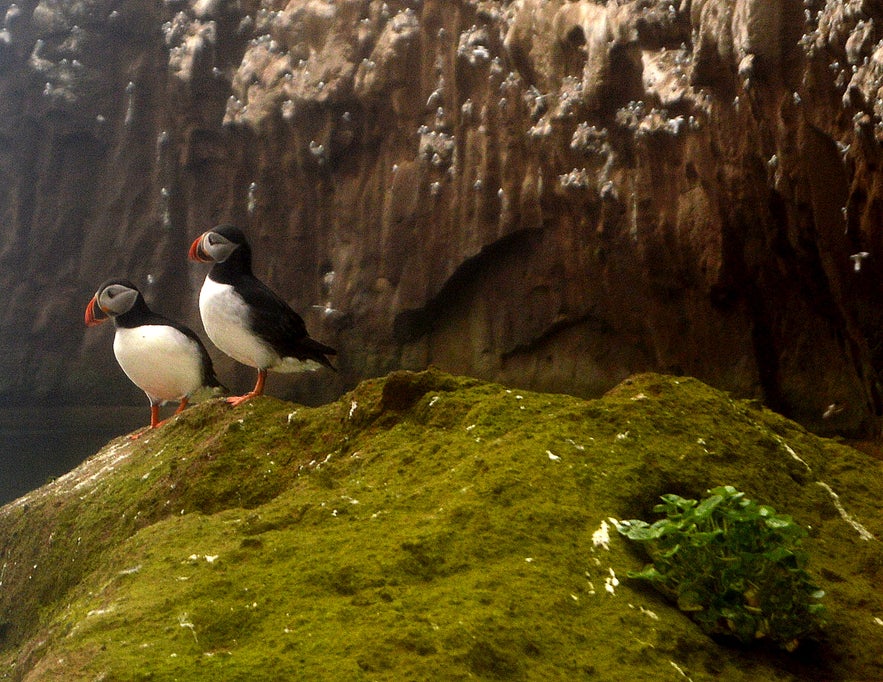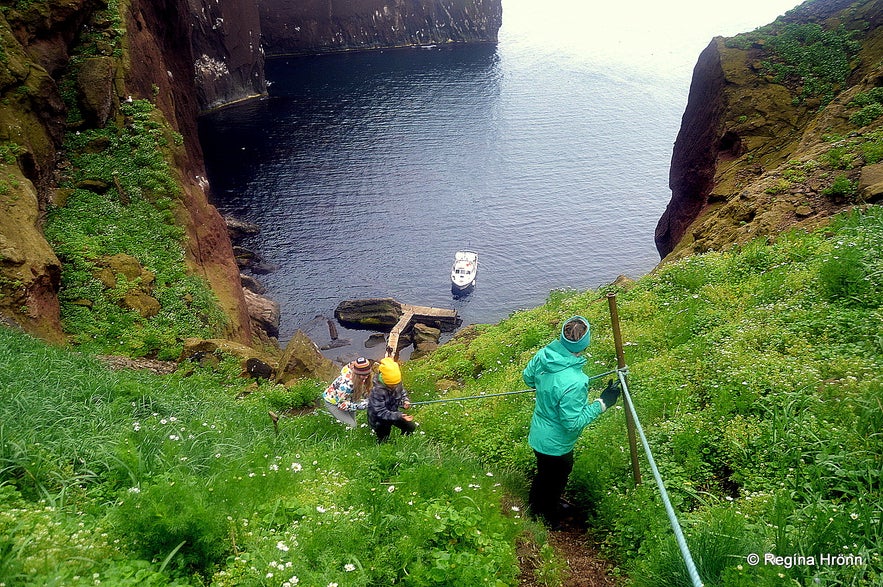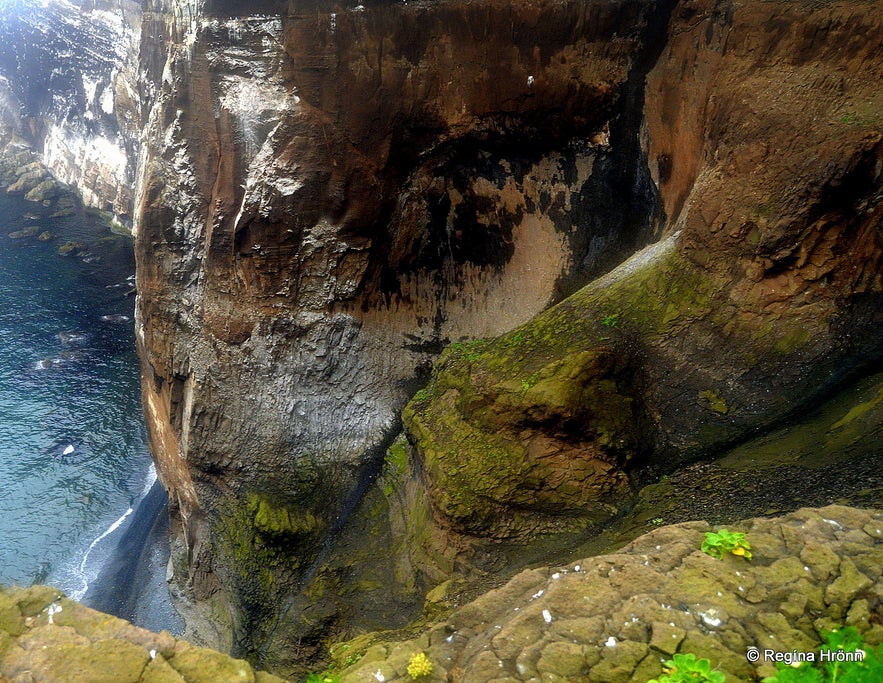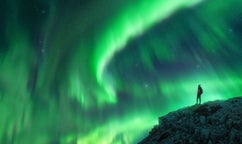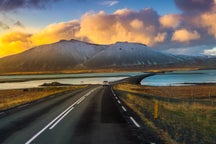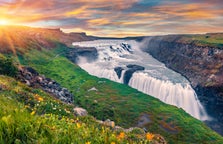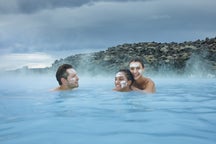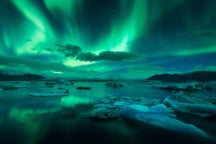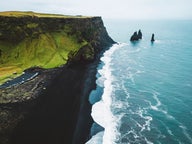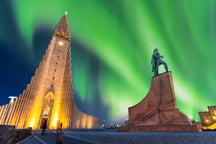I went on a truly memorable trip when I sailed with the Drangeyjarferðir tours, and climbed up to the top of the steep Drangey Island sea cliff in Skagafjörður fjord in North Iceland.
There is only one accessible path to the top of Drangey Island - on the man-made path at Uppgönguvík or the Climbing-Up-Cove. It is a steep path to the top of the 180-meter-high cliff, but ropes and chains make the ascent easier. And a ladder on the final climb.
Top photo: Puffins on Drangey Island - all my photos are taken in fog, so they are a bit gloomy
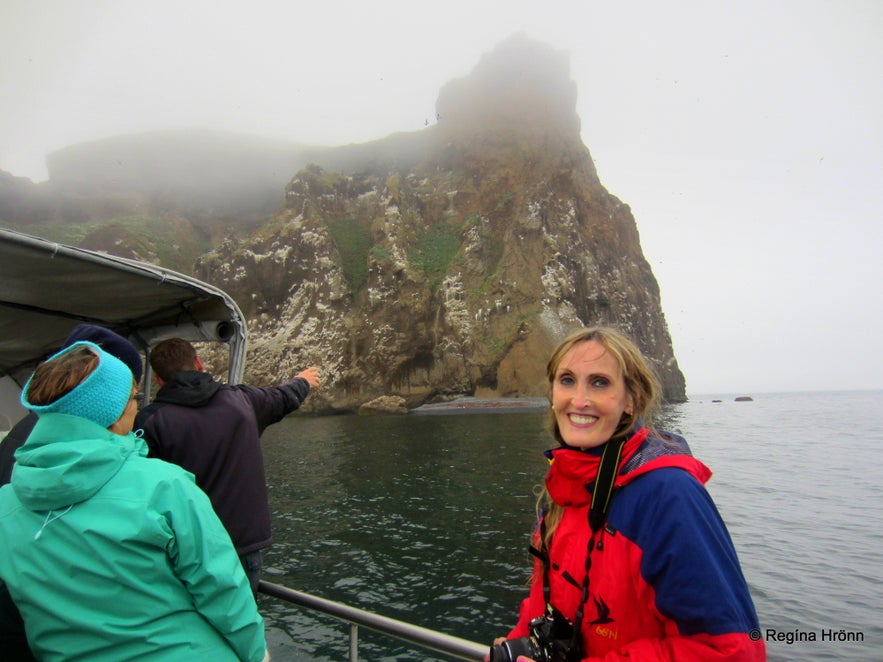 On the boat tour, arriving at Drangey Island.
On the boat tour, arriving at Drangey Island.
Drangey cliff is well known in Icelandic history, as here one of the best-known Vikings in Iceland, Grettir the Strong Ásmundarson (around 996) from the Grettis Saga, sought refuge for his final three years as an outlaw.
Grettir is known for being the longest-surviving outlaw in Viking history in Iceland; he was an outlaw for almost 20 years!
When I joined this tour, I had a fear of heights, and I was terrified of being so high up. I was holding on to the rope for dear life, as you can see in the photo below.
Fortunately, I was partly cured of this phobia by hypnosis a year later, so it is more manageable now.
Climbing up Drangey
Grettir stayed on Drangey Island for 3 years with his brother, Illugi, and Glaumur, who had asked to come with them and work for them, and here Grettir was brutally slain when he was 44 years old.
Grettir was terrified of the dark after his battle with the feared ghost Glámur, who haunted Grettir's dreams. He did not want to be alone in Drangey, so his brother, Illugi, offered to stay with him.
Their poor mother, Ásdís, had to say goodbye to her boys, instinctively knowing that she would never see them alive again.
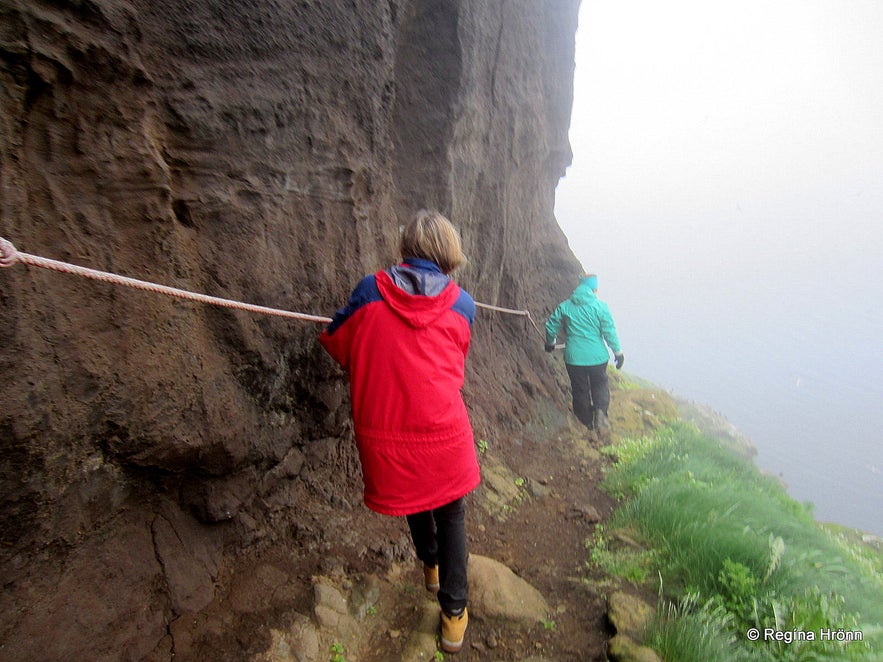 I was holding on to the rope for dear life.
I was holding on to the rope for dear life.
Grettir had chosen the Drangey cliff as his asylum, on the advice of Guðmundur ríki, the rich, who was a well-known character in the Sagas, as there is only one way to climb up to the top of this very steep cliff in the middle of the sea.
When Grettir lived on the island, two ladders were set up to climb onto Drangey, but if they were removed, there was no other way to reach the island, so Grettir was safe here.
This made Drangey an excellent hideout for Grettir, who was hunted throughout his outlawry.
Drangey Island - we were pretty high up, and I felt dizzy
Nowadays, ropes and chains help visitors climb to the top, and the final ascent is via a ladder. It is pretty steep in parts, but even kids can go on this tour, and they seem to love it.
My cousin told me that while she was on the path where I was holding on to the rope for dear life, she froze and couldn't move because she was so scared, but her little daughter had just run along this path in front of her, completely unafraid!
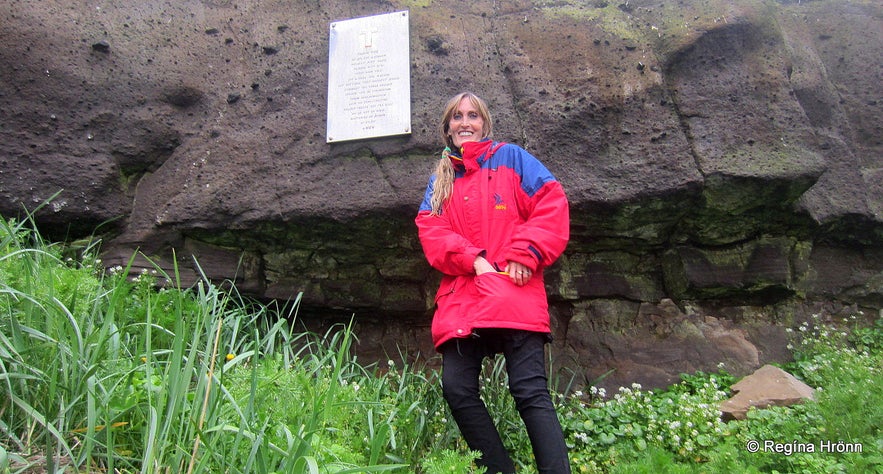
Praying by Gvendaraltari on Drangey Island
We arrived at a spot called Gvendaraltari - the altar of Gvendur, named after bishop Guðmundur the Good, who consecrated the island after a row of accidents.
You will find a plaque on the rock with Faðirvorið - the Lord's Prayer in Icelandic. Guests on the island are supposed to say the prayer out loud before ascending any further.
I said my prayers, as I was pretty scared.
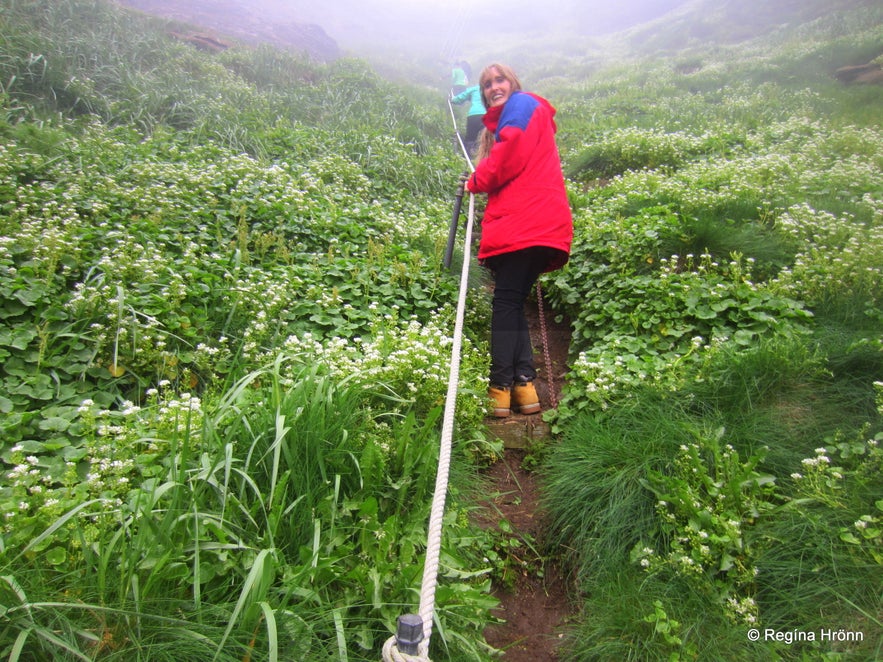 Climbing further and further up Drangey Island into the fog
Climbing further and further up Drangey Island into the fog
My next photo was taken from the ladder, and it shows how steep this route really is.
We encountered fog on the cliff, which affected my photos, but the sea, far beneath the ladder, is still visible in my image.
I was absolutely terrified of being so high up, and dreaded the descent. I thought I would have to be rescued by a helicopter, but that is what fear of heights does to people! But it is pretty steep for everybody.
Pretty steep, eh!
Once on top of the cliff, we visited the Drangeyjarskáli hut, built in 1984, and our guide, Helgi, took a group photo.
Helgi then walked us to the spot on the island where Grettir the Strong had built a hut. One can still see the hole in the ground where the hut stood. It is called Grettisbæli or the Lair of Grettir, and we can find several of his lairs in Iceland.
Here, Grettir found shelter from the northern wind and could collect water from the rock in small bowls.
It was amazing seeing these holes, from which Grettir the Strong drank water some ten centuries ago!
By Drangeyjarskáli hut
We Icelanders study the Sagas in college, and I remember the Saga of Grettir the Strong vividly.
I am a big fan of the Sagas and have read all of them (approx. 44). Grettis saga is one of the longest sagas, but it is an excellent read.
We sat down here by Grettisbæli - the Lair of Grettir and listened to Helgi tell us the story of Grettir and his life here on Drangey.
The group consisted of Icelanders and two French tourists, so Helgi told these stories first in Icelandic and then in English.
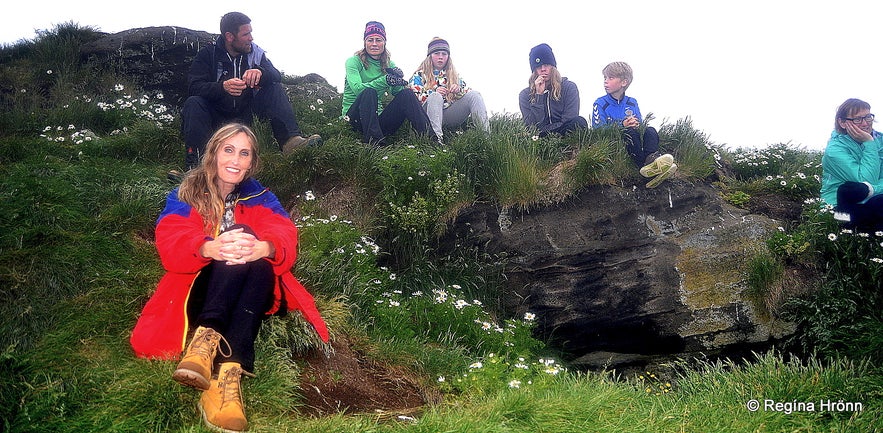 Grettisbæli - the Lair of Grettir on Drangey island
Grettisbæli - the Lair of Grettir on Drangey island
The top of this steep rock is covered in grass, and in the years Grettir was living here, some 80 sheep, belonging to the farmers, were grazing on the island, so Grettir and his companions had plenty to eat.
The farmers were not at all happy that Grettir was eating their sheep, and tried their utmost to drive him away from the island.
There is also a myriad of birds on Drangey, with eggs in abundance. So Grettir and his companions were not lacking in food at that time.
After a couple of years, though, they had eaten all the sheep but one, which was a ram called Hösmagi, which they didn't kill as he was so entertaining ;)

I guess that Hösmagi was a forystusauður - a leader sheep, and that they were badly in need of entertainment after such a long time on the cliff!
Grettir lived on Drangey for approximately 3 years until he was slain on the island. A sorceress had cast a spell on a log, which landed by Drangey.
Grettir wanted to chop it up as firewood, but due to the spell, his axe landed on his foot, and he got a nasty wound. His leg became infected, swollen, and turned dark blue.
At Drangey
Grettir's enemy and the owner of the island, the Viking Þorbjörn Öngull, and his men managed to climb up the cliff after Glaumur had fallen asleep and didn't pull up the ladder, so the coast was clear for the enemies of Grettir.
They attacked and killed Grettir while he was fatally wounded and helpless in bed, and Þorbjörn Öngull cut off Grettir's head with Grettir's own sword.
They also killed Illugi and Glaumur.
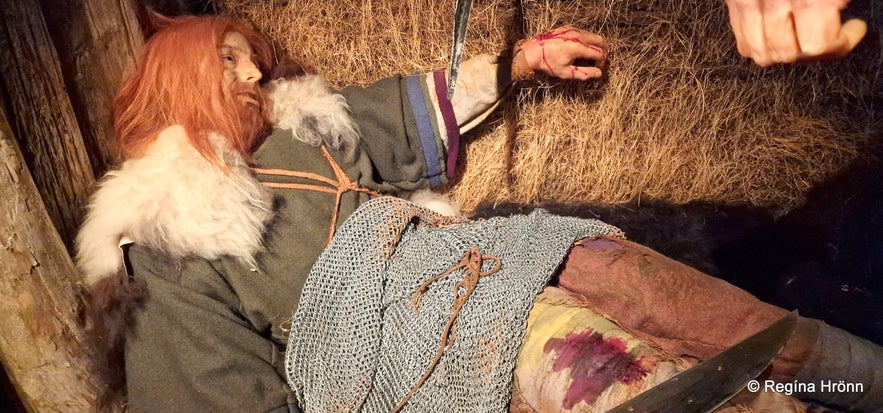 Grettir slain - photo taken at the Saga Museum in Reykjavík, which I recommend visiting.
Grettir slain - photo taken at the Saga Museum in Reykjavík, which I recommend visiting.
Grettir's outlawry was built on a misunderstanding. He was believed to have intentionally burnt alive some 12 men, amongst them two brothers.
Grettir had entered the rest house, where these men were staying, and wanted to ask them for fire; they mistook him for a troll.
They attacked him, and some hit him with firebrands, resulting in a fire spreading out (you can read about this terrible event in the 38th chapter of the Saga of Grettir).
Looking into the fog - zero view - we heard the birds, so we knew that we were standing on a sheer cliff!
After listening to Helgi's fascinating stories about Grettir's life and death on Drangey, we made the final hike to the top of the approximately 180 m-high cliff.
On the way to the top, we stopped at the very steep cliff edge and were shown Grettisbrunnur, or the Well of Grettir, where Grettir collected water.
Several places on the cliff are named after Grettir.
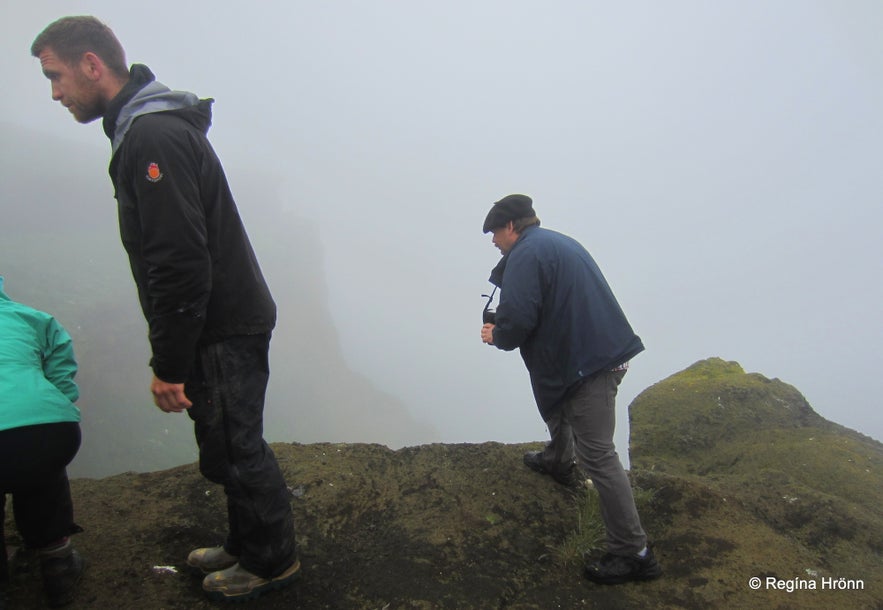 Looking into the fog
Looking into the fog
When we got to the top of the cliff, Helgi, the tour guide, took us to the edge, which was quite scary in the fog, and asked us to hold our hands behind our ears.
That way, the sound of the birds beneath the cliffs multiplied. It was quite something, standing there in the fog, listening to the squawk of the myriads of birds on the cliffs.
And everywhere we looked, there were birds. Only the fog prevented me from taking more photos.
Their squawks and the echo of the spirit of the Saga of Grettir meet in the cliffs, and I would strongly suggest you read the Saga of Grettir before you visit Drangey Island.
Puffins in the fog on Drangey Island
Drangey is home to a myriad of birds, and their guano has coloured the cliff white in places. This only adds to the island's rugged beauty.
The bird species found in abundance on the cliff are guillemot, puffin, and auk, as well as many others, e.g., fulmar, puffin, kittiwake, raven, and falcon.
We also saw several young ravens in the fog. And a lot of puffins.
If you are a bird lover, then you will love visiting Drangey Island.
Birds on Drangey Island
The cute puffin is Iceland's most popular bird, and most visitors seek it out. With its multi-coloured beak and orange feet, it is pretty adorable.
On Drangey, you will see puffins all over the island, and you can get beautiful photos of them. It must be breathtaking visiting Drangey Island on a sunny day.
Unfortunately, it was foggy, but here is a link to Drangeyjarferðir tours, which has some lovely, clear photos of Drangey Island and the puffins.

Where there are puffins, there are puffin holes, called burrows.
The puffins make around 3-meter-long holes from the top of the cliff, so we were actually walking on top of the puffin holes while exploring the top of the rock.
It was pretty strange knowing we were almost stepping on the puffins, and one had to take care not to stumble or get one's feet stuck in the holes, as they were all over the grass.
A puffin hole on Drangey Island
Birds' eggs are collected in Drangey in the spring, when both the eggs are collected, and the birds are caught. We could see ropes and ladders for this purpose in many places on the island.
Drangey has always been a good food source for the people living in Skagafjörður, and it is a landmark in the fjord, often called the Pearl of Skagafjörður.
To the south of Drangey, a lone steep rock stands in the sea. It is called Kerling (woman). Earlier on, a rock on the north side of Drangey was called Karl (man), but it collapsed in an earthquake centuries ago.
Kerling rock - still foggy
In many places in Iceland, rocks like these can be seen, with similar names. They are trolls that have been caught in the sunlight, but as everybody knows, the night trolls turn into stone by the first rays of the sun.
Karl and Kerling were crossing the fjord with their cow when the sun came up - and all of them turned into stone. The cow turned into Drangey Island.
Both Drangey and Kerling looked quite ominous in the fog. The fog sure added to the mystery of this historical island.
We have many such stories in Iceland, e.g., Kerlingarskarð Pass in Snæfellsnes in West Iceland - the Folklore of the Giantess & her Fiancé.
A little bit earlier, we were on top of the island in the fog
Now, back to Grettir the Strong when he was still alive.
Fortunately, Grettir had some friends on the mainland, one of whom lived at the farm Reykir in Reykjaströnd, Þorvaldur by name.
One day, their fire was somehow extinguished, and Grettir swam to the mainland to get fire from his friend there.
This deed has been named the Drangeyjarsund swim - Grettir swam for some 7 km in the cold sea!
Soaking in Grettislaug
After he came ashore, he warmed up in a natural hot pool at Reykir. Grettir's Saga describes how Grettir baked in the hot pool for a long time before falling asleep in Þorvaldur's house.
Þorvaldur gave him fire and a lift back to the island in his boat. I have seen drawings of Grettir swimming with the fire, but even if Grettir were no ordinary man, it is impossible to do so with a lit torch in one hand.
There is now a replica of this hot pool, Grettislaug, next to the Drangeyjarferðir tour's Information Centre.
It was lovely warming up in Grettislaug and the newer pool next to it, Jarlslaug, or the Pool of the Earl. The pool temperature is around 39° C.
Soaking in Jarlslaug
Jarlslaug (the pool of the Earl) was built in honour of the late Jón Eiríksson Drangeyjarjarl, who was the tour operator for Drangeyjarferðir for many years and who built Grettislaug pool.
Jón Eiríksson's son, Viggó, and his grandson, Helgi Rafn, now operate Drangeyjarferðir tours. Helgi Rafn, who is in my photo below, was our very knowledgeable and friendly guide on the tour.
Daily boat trips to Drangey depart at 9:30 am from June 1st to August 20th (check their website for updates). The tour lasts for 4 hours, of which the boat ride to Drangey is 25 minutes.
We took the boat from Reykir, but I see on their website that they depart from the Sauðárkrókur marina at 9:30.
Helgi Rafn, our tour guide
The Drangeyjarferðir tour is a fantastic guided tour. I highly recommend joining the tour when you are travelling in this area. Drangey is so rich in history and birdlife, and visiting it is a truly memorable experience.
To visit this area, you can rent a car in Reykjavík and make it a part of your North Iceland experience. Also, check out the best self-drive tours in Iceland.
Here is the location of Drangey Island on Google Maps.
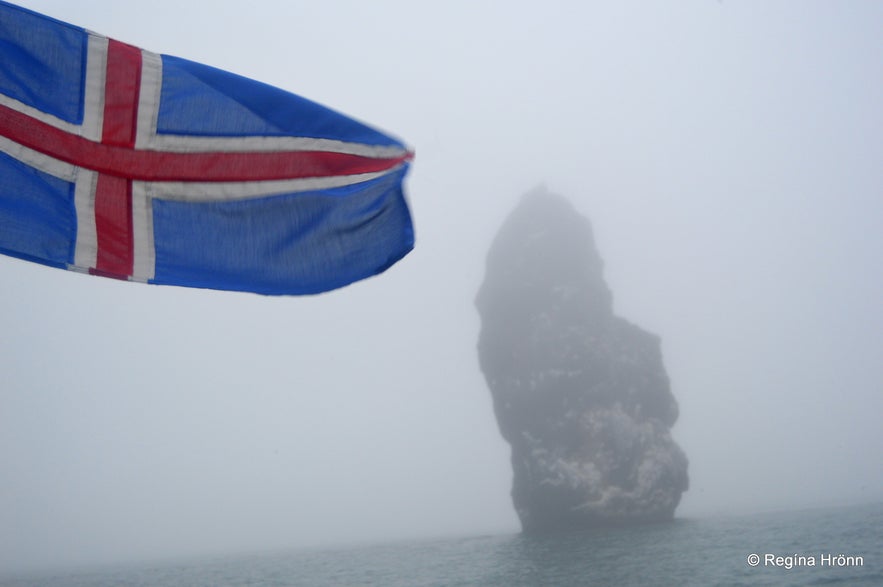 This was my view from the boat when we sailed back to the mainland ;)
This was my view from the boat when we sailed back to the mainland ;)
I have written another travel blog about Grettir the Strong and Grettisbæli Lair in Hítardalur valley, if you want to learn more about Grettir's hiding places.
Have a lovely time visiting Drangey Island :)
Source: The Saga of Grettir

